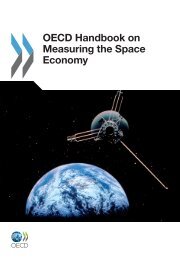Evaluating Country Programmes - OECD Online Bookshop
Evaluating Country Programmes - OECD Online Bookshop
Evaluating Country Programmes - OECD Online Bookshop
Create successful ePaper yourself
Turn your PDF publications into a flip-book with our unique Google optimized e-Paper software.
<strong>Evaluating</strong> <strong>Country</strong> <strong>Programmes</strong><br />
202<br />
Box 8.3. Basic evaluation issues<br />
It is essential to define the questions which will be addressed in the evaluation –<br />
these are often referred to as the “issues” of the evaluation. The issues will provide a<br />
manageable framework for the evaluation process and the basis for a clear set of conclusions<br />
and recommendations. The following are basic groups of evaluation issues:<br />
Rationale. Does the undertaking make sense? Are the objectives relevant and<br />
realisable? Should alternative objectives be considered?<br />
Objectives achievement. Evaluation is very difficult unless the objectives which the<br />
evaluated project/programme was to achieve have been clearly defined and the<br />
project agreements and operational plans and arrangements for obtaining relevant<br />
baseline data have been made. To what extent were the original objectives<br />
achieved? Or are likely to be achieved? What were the major factors influencing the<br />
achievement or non-achievement of objectives? Should objectives not have been<br />
stated clearly enough to allow for an evaluation of goal achievement, an assessment<br />
of impact and effects of the activities undertaken should still be attempted.<br />
Impacts and effects. What has happened as a result of the project/programme?<br />
This involves not only direct outputs but, very importantly, the basic impacts and<br />
effects on the social, economic, environmental and other development indicators<br />
resulting from the activity. The examination should be concerned with both<br />
intended and unintended results, and must also explain the positive and negative<br />
impact of external factors, such as changes in basic policy environments, general<br />
economic and financial conditions.<br />
The aim of asking these questions is to ensure that the evaluator can assess the<br />
information and formulate conclusions and recommendations concerning:<br />
The overall results. How successful was the undertaking? Why? Do impacts and<br />
effects justify costs? Were the objectives achieved within time and within the budget?<br />
Were there any major shortcomings? Were there major achievements?<br />
Sustainability. The question of whether achievements are sustainable in the<br />
longer run is of critical importance.<br />
Alternatives. Are there better ways of achieving the results?<br />
Lessons learned. What are the general lessons which can be drawn and which<br />
should be borne in mind when embarking on future programmes?<br />
Source: <strong>OECD</strong>, Development Assistance Manual, DAC Principles for Effective Aid, Paris 1992,<br />
pp. 136-137.<br />
of country programmes of German development co-operation can be specified as<br />
follows:<br />
– Rationale of the country programme: One of the main tasks of the BMZ’s country<br />
concepts is to formulate the rationale of the engagement of German development<br />
co-operation in a partner country or, more precisely, in the priority<br />
<strong>OECD</strong> 1999

















![CQE=U]^\]Z: KAZAKHSTAN - OECD Online Bookshop](https://img.yumpu.com/3915768/1/190x253/cqeuz-kazakhstan-oecd-online-bookshop.jpg?quality=85)